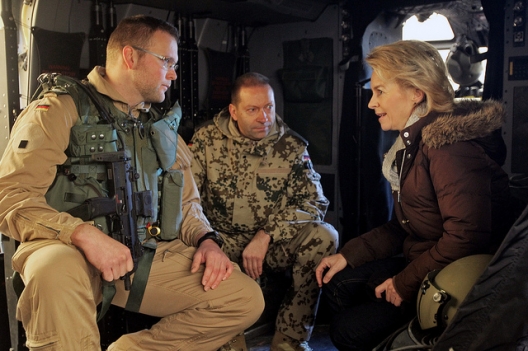 New Defense Minister Ursula von der Leyen says that it is time for Berlin to take more responsibility. She also dreams of a European army. . . .
New Defense Minister Ursula von der Leyen says that it is time for Berlin to take more responsibility. She also dreams of a European army. . . .
SPIEGEL: What will Germany’s bolstered engagement in Africa look like?
Von der Leyen: The main focus will be on Mali. Already, the Bundeswehr is training African soldiers in Mali and is assisting in the establishment of an army. Currently, the maximum number allowed by the mandate is 180 troops, 99 soldiers are there. We can strengthen this engagement and our allies, the French first and foremost, expect as much. I can imagine increasing the mandate to 250. In addition, European Union foreign ministers last week cleared the way for a Central Africa mission. Now we have to ensure transparency regarding this mission. The chancellor, Foreign Minister Frank-Walter Steinmeier and I completely agree that it should not become a German combat operation. But the Bundeswehr, with its MedEvac Airbus for example, possesses the special capability of rapidly treating and evacuating the wounded. Should no other ally be able to make this capability available, we should offer to do so. A precondition for such a mission, however, is that the Bangui airport be secured. It is also clear that an expansion of the Mali mission and the aid for Central Africa would each require a parliamentary mandate. Ultimate control of the Bundeswehr lies with parliament.
SPIEGEL: In recent years, allies have repeatedly complained that Germany stands on the sidelines when it comes to foreign missions and lets others do the real work. Does Germany need to take more responsibility around the world?
Von der Leyen: Within the framework of our alliances, yes. Due to globalization, distant conflicts are now much closer to Europe, whether we like it or not. That’s why it’s in the European Union’s best interests to provide for security and stability by helping countries live up to their responsibilities. In Mali, for example, we are training soldiers who are then deployed together with African Union troops in the country’s north. In recent years and decades, the fall of the Berlin Wall, digitalization and the integration of the financial markets have illustrated the dramatic consequences of the world growing closer together. Now we have to realize that globalization also includes completely new challenges for defense and security policy. Europe must speak with a single voice in the future when it comes to security policy. But that only works if the responsibilities and risks are divided fairly among the partner countries. . . .
SPIEGEL: The Security Council abstention was the result of former Foreign Minister Guido Westerwelle’s policy of “military restraint.” Are you advocating for a change in course?
Von der Leyen: There is no crisis that can be solved by military means alone. When one goes in, the political solution must be pushed forward in parallel. Important concepts are: humanitarian aid, economic cooperation and civilian protection, such as through the establishment of a police force. But Europe will not make progress in the global power game if one country always daintily stays away from military operations while another country storms forward without consulting others. We have a curious situation at the moment: Germany is currently engaged in a dozen missions around the world, demanding an enormous military and financial effort. But our allies continue to remember our reluctance, the product of our restraint. . . .
SPIEGEL: Is your goal that of establishing a joint European army?
Von der Leyen: There are many interim steps to be taken before getting to that point. What is clear, however, is that if that happens, European parliaments cannot be rendered powerless. But I believe that joint armed forces would be a logical consequence of an increasingly close military cooperation in Europe.
Translated from the German by Charles Hawley.
Image: German Defense Minister Ursula von der Leyen in Afghanistan (photo: Bundeswehr)

